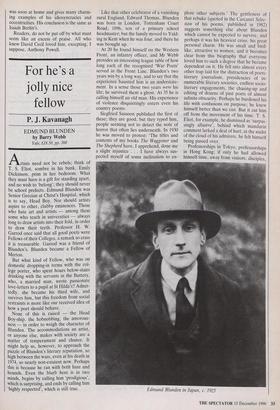For he's a jolly nice fellow
P. J. Kavanagh
EDMUND BLUNDEN by Barry Webb Yale, £18.50, pp. 360 Artists need not be rebels; think of T. S. Eliot, sombre in his bank, Emily Dickinson, prim in her bedroom. What they must have is a gift for standing apart, and no wish to 'belong'; they should never be school prefects. Edmund Blunden was Senior Grecian at Christ's Hospital, which is to say, Head Boy. Nor should artists aspire to other, clubby eminences. Those who hate art and artists — among them some who teach in universities — always long to draw artists into their fold, in order to draw their teeth. Professor H. W. Garrod once said that all good poets were Fellows of their Colleges, a remark so crass it is treasurable. Garrod was a friend of Blunden's. Blunden became a Fellow of Merton.
But what kind of Fellow, who was on domestic dropping-in terms with the col- lege porter, who spent hours below-stairs drinking with the servants in the Buttery, who, a married man, wrote passionate love-letters to a pupil at St Hilda's? Admit- tedly, she became his third wife, and survives him, but this freedom from social restraints is more like our received idea of how a poet should behave. None of this is raised — the Head Boy-ship, the hobnobbing, the amorous- ness — in order to weigh the character of Blunden. The accommodations an artist, or anyone else, makes with society are a matter of temperament and chance. It might help us, however, to approach the puzzle of Blunden's literary reputation, so high between the wars, even at his death in 1974, so nearly non-existent now. Perhaps this is because he ran with both hare and hounds. Even the blurb here is in two minds, begins by calling him 'prodigious', which is surprising, and ends by calling him 'highly respected', which is still true. Like that other celebrator of a vanishing rural England, Edward Thomas, Blunden was born in London, Tottenham Court Road, 1896, son of a primary school headmaster; but the family moved to Yald- ing in Kent when he was four, and there he was brought up.
At 20 he found himself on the Western Front, an infantry officer, and Mr Webb provides an interesting league table of how long each of the recognised War Poets' served in the Front Line. Blunden's two years win by a long way, and to say that the experience haunted him is an understate- ment. In a sense those two years were his life; he survived them a ghost. At 35 he is calling himself an old man. His experience of violence disquietingly enters even his country poems.
Siegfried Sassoon published the first of these; they are good, but they typed him, people seeming not to detect the note of horror that often lies underneath. In 1930 he was moved to protest: 'The titles and contents of my books The Waggoner and The Shepherd have, I apprehend, done me a slight injustice . . . I have always sus- pected myself of some inclination to ex- plore other subjects.' The gentleness of that rebuke (quoted in the Carcanet Selec- tion of his poems, published in 1982) suggests something else about Blunden which cannot be expected to survive, and perhaps it was his heaviest cross: his great personal charm. He was small and bird- like, attractive to women, and it becomes clear from this biography that everyone loved him to such a degree that he became dependent on it. He fell into almost every other trap laid for the distraction of poets: literary journalism, presidencies of in- numerable literary societies, endless socio- literary engagements, the chasing-up and editing of dozens of past poets of almost infinite obscurity. Perhaps he burdened his life with confusions on purpose; he knew himself better than we can. But it cut him off from the movement of his time. T. S. Eliot, for example, he dismissed as 'surpas- singly allusive', behind which mandarin comment lurked a deal of hurt; in the midst of the cloud of his admirers, he felt himself being passed over.
Professorships in Tokyo, professorships in Hong Kong; if only he had allowed himself time, away from visitors, disciples, Edmund Blunden in Japan, c. 1925 grandees, to write some general guide to literature, for he must have been a great teacher, adored by his students. All this, like his charm, has passed. By the time he was elected Professor of Poetry at Oxford in 1966, bounced into it by the politics- playing of Enid Starkie, it was too late. It was almost farcical, alas: losing his lecture, putting it in his mortar-board, then putting his mortar-board on his head. It is a sad note to end on. His biography is worth reading as an account of the hellishness of war, hellishness of literary journalism, hellishness of academic life, endured by a sweet-natured man. 'The Pike' is a good poem, so is 'Perch-fishing', and these, like his other titles, are deceptive. 'Solutions', a later one, contains his own fierce comment on the course his life had taken. Forced to write on, 'Who was Shakespeare?', he takes it out on a primrose, beheading it, 'for blooming insolence'.



























































 Previous page
Previous page